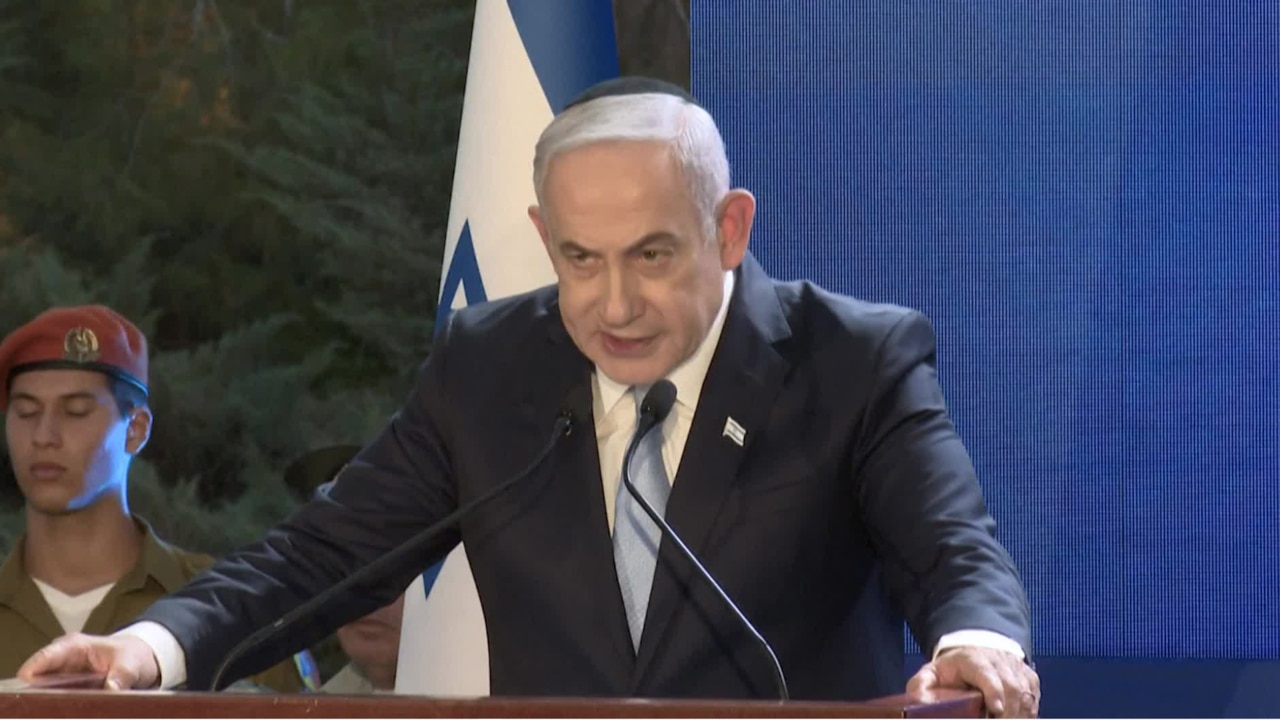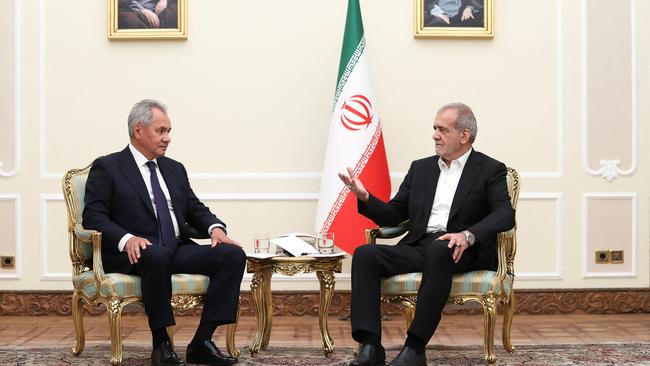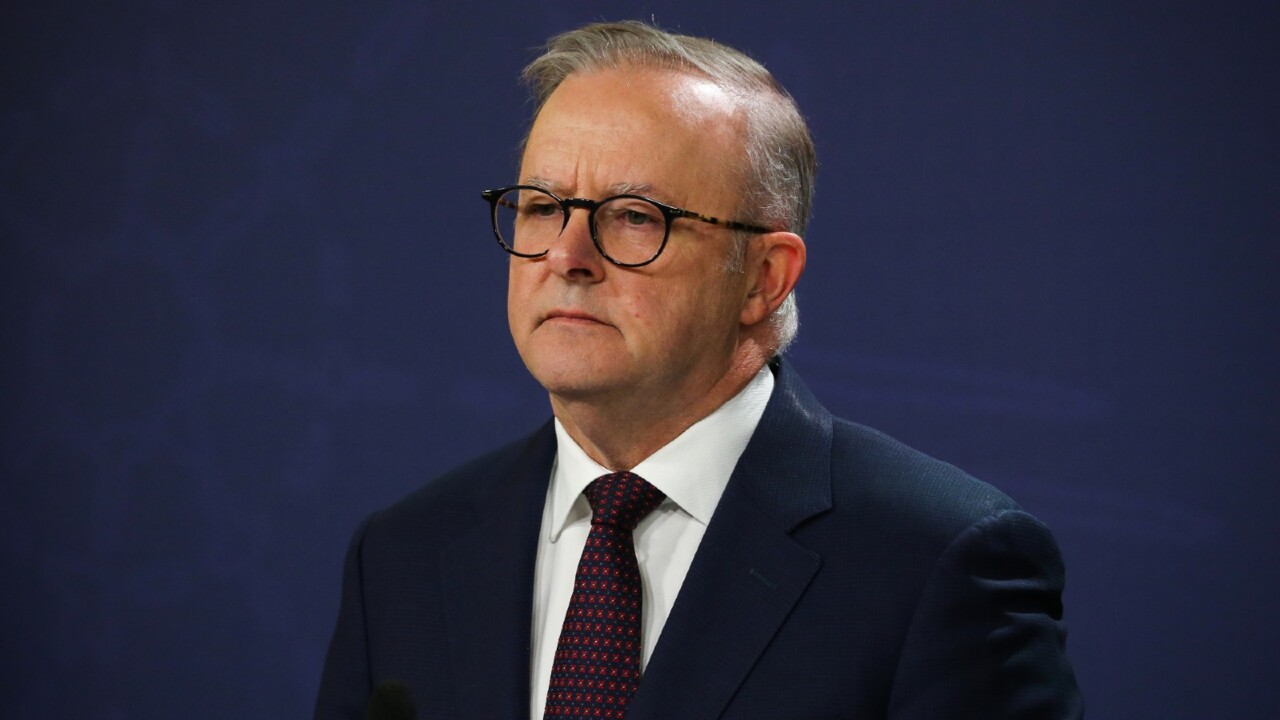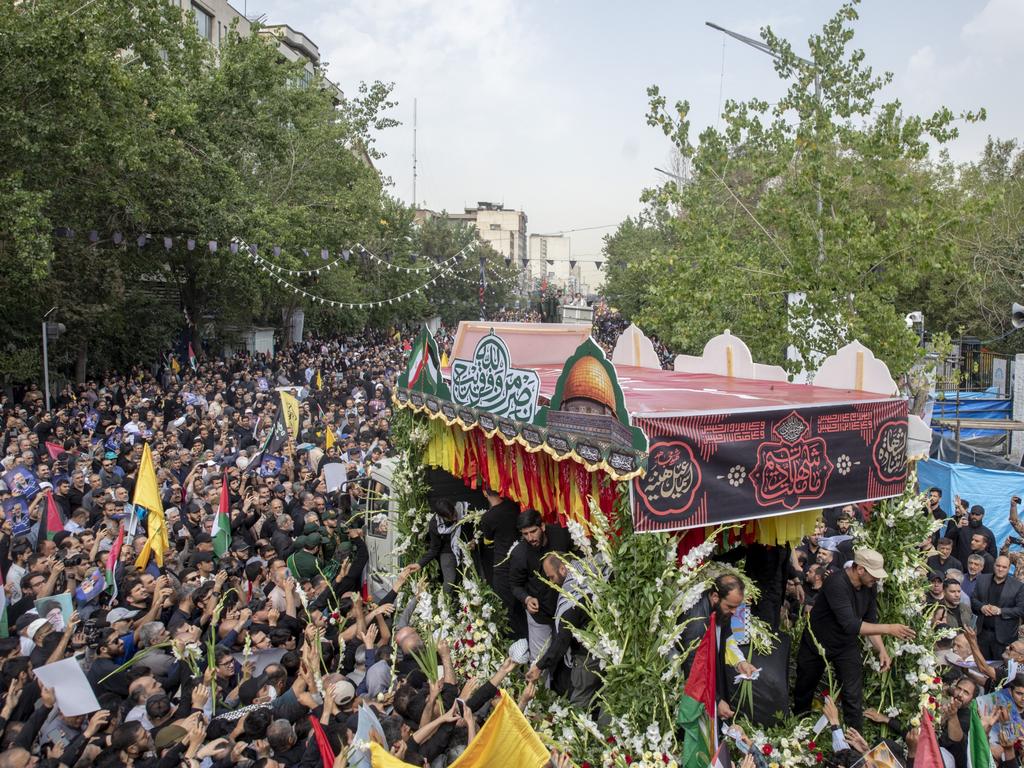Mideast braces for more violence amid warnings of Iranian attack
US intelligence reportedly warns Iran plans one attack against Israel with a second wave led by Hezbollah as the IDF advises a pre-emptive attack on Lebanon and US CentCom chief visits Jerusalem.

US intelligence has reportedly briefed President Joe Biden that Iran’s retaliatory attack on Israel is likely to take place in two waves, one from Iran and the other by Hezbollah and other Iranian proxies.
In the meeting Mr Biden and Kamala Harris held with the National Security Council this morning (AEST) intelligence officials said it was still unclear which of the two forces would attack first as Tehran was still undecided, the Axios website reports.
Israeli military has reportedly presented Benjamin Netanyahu with plans for a pre-emptive strike on Hezbollah, advising that the country should not wait for the Iran-backed group to attack before taking action.
As Iran warns that its attack will come ‘imminently’ – within the next 24 to 48 hours -
Israeli Defence Forces leaders told the Prime Minister and Defence Minister Yoav Gallant: “The chances of escalation on the northern front are increasing. It would be prudent to lead the initiative,” according to Israeli TV.
“We must undermine the enemy’s perception that we are waiting for their move,” they added.
Mr Netanyahu has not yet accepted the proposal, according to the Jerusalem Post.
The crisis has continued to escalate since last week’s twin assassinations of Hamas political chief Ismail Shukr in an unprecedented attack in Tehran, and Hezbollah military chief Fuad Shukr in the group’s stronghold in Beirut.
In a show of support with Israel, US Central Command chief, General Michael Kurilla met with Mr Gallant and IDF Chief of Staff Hery Halevy to discuss coordinating “defence co-operation between the respective establishments and militaries,” the Defence Ministry said.
“They also discussed ways to expand the international coalition facing aggressive activities by Iran and its proxies against Israel, and destabilising the Middle East region,” the ministry added.
Meanwhile, Russia has delivered advanced air defence and radar equipment to Iran, US media reports.
It came after Russia’s Security Minister Sergei Shoigu arrived in the capital, telling reporters: “We are ready for full co-operation with Iran on regional issues.”
In a meeting with foreign diplomats in Tehran, acting Foreign Minister Ali Bagheri-Kani attacked what he called the complicity of the US and some European countries in supporting Israel, he said afterward on social media.
“Such aggression cannot go unanswered,” he told the diplomats. “The Islamic Republic’s response will be definitive and decisive.”
An Arab diplomat said that an Iranian official had said on Monday that an attack could occur “imminently,” within the next 48 hours, according to the Wall St Journal.

Meanwhile, Mr Gallant told the military it must prepare a “quick transition to offence,” during a visit to the Israeli Air Force’s command centre in Tel Aviv, Israeli media reports.
“Our enemies are carefully considering their steps thanks to the abilities you have demonstrated in the last year. However, we must prepare for all possibilities, including a quick transition to offence,” Mr Gallant said.
US Defence Secretary Lloyd Austin on Friday ordered additional firepower to the region ahead of an expected attack, including an F-22 fighter squadron armed with air-to-air weapons capable of shooting down incoming missiles. He also ordered the aircraft-carrier strike group the USS Abraham Lincoln, which is currently in the Pacific, to replace the USS Theodore Roosevelt to maintain a carrier presence in the region.
General Erik Kurilla, the head of US Central Command, has also flown to the region, as he did in April, and has arrived in Israel, the Israeli military saidy.
On Monday morning local time, Iran issued a notice to pilots and aviation authorities warning of likely disruption to GPS and navigational signals, which are used by pilots for positional data and to follow flight routes. The warning was posted on the website of the US Federal Aviation Administration.
Iran issued similar warning on April 13, the day that Tehran launched its first-ever direct military attack on Israel.
However in April Iran had given the US advance notice of its attack, allowing Israel’s allies to defend the country, shooting down most of the barrage of drones and missiles before they arrived in Israel.
This time, Iran has rebuffed US and Arab diplomats’ attempts to ease regional tensions, insisting that retaliation for the assassinations of Haniye and Shukr was inevitable and they “don’t care” if it leads to a wider war.
Mr Biden and Secretary of State Antony Blinken have engaged in frantic diplomacy to try to ease the tensions sparked by a suspected Israeli attack that killed Hamas political leader Ismail Haniyeh in Tehran.
The president called King Abdullah II of Jordan, which helped down Iranian drones and missiles in an earlier showdown in April, while Mr Blinken called top officials in Qatar and Egypt, the key intermediaries seeking a ceasefire in the 10-month Israel-Hamas war.
“We are engaged in intense diplomacy, pretty much around the clock, with a very simple message – all parties must refrain from escalation,” Mr Blinken said after the security council meeting.
“It’s also critical that we break this cycle by reaching a ceasefire in Gaza,” said Mr Blinken, who has also spoken since Sunday with G7 counterparts and Iraq’s prime minister.
On Monday local time, multiple US personnel were injured in a rocket attack on a base in Iraq, adding to the already heightened regional tensions.
Mr Biden had been hoping in his final months in office to end the Gaza war and work on clinching a landmark deal between Israel and Saudi Arabia.
Instead, he has boosted the US military presence in the Middle East in a show of strength to Iran.
After staunchly backing Israel’s war against Hamas, Mr Biden has made clear his frustration with Israeli Prime Minister Benjamin Netanyahu over the killing of Haniyeh, who was involved in the ceasefire negotiations.
Mr Blinken, who has warned that Iran would strike within 24 to 48 hours, made a new pitch for Mr Biden’s ceasefire plan that would freeze fighting in Gaza and return hostages seized in the October 7 mega-attack on Israel by Hamas.
A ceasefire “will unlock possibilities for more enduring calm, not only in Gaza itself, but in other areas where the conflict could spread,” Mr Blinken said as he met Foreign Minister Penny Wong.
In a veiled allusion to US frustrations, Mr Blinken said, “What it really comes down to, really, is all parties finding ways to come to an agreement, not look for reasons to delay or to say no.” “It is urgent that all parties make the right choices in the hours and days ahead,” he said.
Mr Biden flew to the White House after a weekend home in Delaware, and after a kiss for First Lady Jill Biden, he headed straight into the Oval Office without commenting to reporters.

The White House said that Mr Biden and the Jordanian king in their call “discussed their efforts to de-escalate regional tensions, including through an immediate ceasefire and hostage release deal.”
King Abdullah called for “an immediate and permanent ceasefire to end the catastrophe in Gaza” and for “ceasing all escalatory measures,” according to a readout by the Jordanian royal court.
Iran fired directly at Israel in April, taking their long shadow war into the open following a strike on an Iranian diplomatic building in Syria.
The United States helped intercept the drones and missiles, and damage was minimal.
But Jordan – in a delicate position with its large Palestinian population and a peace deal with Israel – has insisted it does not want to be a battleground.
State Department spokesman Matthew Miller said that in April, “we were able to chart a path that ultimately got us through that time without tipping into a wider war.” “But every time you have one of these cycles of escalation, you have a risk of parties miscalculating, you have the risk of them taking actions that get out of hand,” Miller told reporters.
With AFP, Dow Jones





To join the conversation, please log in. Don't have an account? Register
Join the conversation, you are commenting as Logout